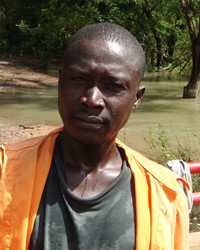Kotoko, Lagwan in Chad

Photo Source:
Ken Doerr - Flickr
Creative Commons
|
Send Joshua Project a map of this people group.
|
| People Name: | Kotoko, Lagwan |
| Country: | Chad |
| 10/40 Window: | Yes |
| Population: | 1,800 |
| World Population: | 10,600 |
| Primary Language: | Lagwan |
| Primary Religion: | Islam |
| Christian Adherents: | 0.20 % |
| Evangelicals: | 0.10 % |
| Scripture: | Translation Needed |
| Ministry Resources: | No |
| Jesus Film: | No |
| Audio Recordings: | Yes |
| People Cluster: | Chadic |
| Affinity Bloc: | Sub-Saharan Peoples |
| Progress Level: |
|
Introduction / History
Lagwan Kotoko people live in the northern part of Cameroon, by the Logone River. Others live across the border in Chad. The Lagwan Kotoko are traditionally fishermen and farmers, making use of the Logone River to irrigate their fields. Their language area extends into Chad to the east. The town of Logone-Birni is the hub of the language area with a few surrounding villages in Cameroon and Chad. A number of Lagwan speakers also live in the larger cities of Cameroon, Nigeria and Chad. Linguistically, Lagwan is one of the eight Kotoko languages.
What Are Their Lives Like?
Half of their fish is salted, dried and sold. Their main crops are rice, millet, sorghum, maize, manioc and peanuts. Cotton is a cash crop. Most Lagwan Kotoko live in villages surrounded by a stone wall to keep out animals and robbers. Village elders make important decisions and deal with outsiders.
The Kotoko marry within their group. A man may have up to four wives if he can afford them. The life expectancy of the Lagwan Kotoko is 49 years. Parents tend to have a large number of children. Almost half of the population is under 16 years old.
What Are Their Beliefs?
Sunni Islam dominates as the primary religion of the Lagwan Kotoko. Their brand of Islam is heavily influenced by folk religion and reverence for their ancestors and saints. Most Kotoko do not pray directly to Allah but ask their ancestors and natural spirits to intercede for them. It is not known if there are any Lagwan Christians in Chad, but one estimate is that perhaps ten percent of those Kotoko living in neighboring Cameroon now profess Jesus as Lord. Sunni Muslims attempt to obey the teachings of the Koran and the prophet Mohammad. Sunnis believe that by following the Five Pillars of Islam that they will attain heaven when they die. Allah, the supreme God of the universe, determines who enters paradise. Sunnis pray five times a day facing Mecca. They fast the month of Ramadan. They attend mosque services on Friday. If a Muslim has the means, he or she will make a pilgrimage to Mecca once in his or her lifetime. Muslims are also prohibited from drinking alcohol, eating pork, gambling, stealing, using deceit, slandering, and making idols. The two main holidays for Sunni Muslims are Eid al Fitr, the breaking of the monthly fast and Eid al Adha, the celebration of Abraham's willingness to sacrifice his son to Allah.
What Are Their Needs?
Malaria is one of the primary causes of death among the Kotoko. Two other serious medical problems and causes of death are African sleeping sickness and HIV/AIDs. The Chadian government and NGOs are working to establish health clinics and hospitals where the Kotoko peoples live. Chadians who live in cities have access to schools for their children. Outside of cities, most children do not attend school and work from an early age helping support their families.
Prayer Points
Pray that Kotoko parents will be able to provide for their children. Pray that Kotoko Christians in Cameroon would be led by the Spirit to share the good news with the Kotoko of Chad. Pray that linguists would be able to translate the Bible into Lagwan Kotoko and that this Bible would find acceptance among the people. Pray that the Lord would send medical and educational workers to the Kotoko of Chad. Pray that a strong movement to Jesus will bring whole Lagwan Kotoko families and communities into a rich experience of God's blessings.